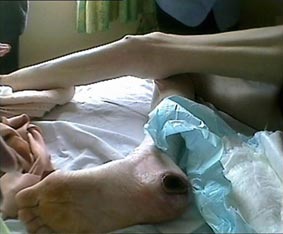Serious flaws persist in HSE nursing home inspections

Vast majority of private nursing-home reports in 2006 are inconsistent, inadequate and incomplete, despite Leas Cross revelations in 2005. By Sara Burke
Inspections carried out on 90 private nursing homes between June and October 2006 show that some homes are still inadequately staffed, deaths are still not being recorded or reported, restraints are in use without recommended protocols, and there is inadequate prevention and management of bed-sore care.
The inspection reports also show that drug records are not being signed off on a daily basis as is required by legislation; there is poor sanitation and cleaning standards; wheelchair-bound residents are accommodated in upstairs rooms, which, as well as being a potential fire hazard, restricts their access to the outdoors.
Many of the key care and welfare requirements outlined in the 1993 Nursing Home Regulations receive scant attention in the reports. There is rarely a mention of the standard of nursing care, access to occupational or physiotherapy facilities, recreational opportunities or competency of staff. The reports do not tell how long inspections lasted, there is no indicator of staff turnover, no reference to suitability of food, and conditions of registration are not reviewed.
Published reports on the Health Services Executive (HSE) website demonstrate significant inconsistencies between inspections. While a minority of the published inspections are of a good standard, the vast majority are inadequate and incomplete.
Ninety of the 298 private nursing homes listed on the HSE website have published reports. There are no published reports from any nursing homes in 16 counties, where there are at least 145 homes. Public nursing homes are not being inspected. There is no complaints procedure in place.
On 10 November, the day the HSE launched the Leas Cross Review, Aidan Browne, the most senior HSE executive responsible for care of the elderly said, "Our new inspection system is consistent, robust and vastly improved."
A review of the 90 inspection reports published on the HSE website shows that this is not the case. The published reports are not consistent and in many cases are weak and inadequate. The HSE said that by the end of the year they hoped all inspections would be published on their website. In 2005, there were 443 registered private nursing homes. To meet the end-of-year commitment, at least 357 inspection reports would need to be published by 31 December 2006. Inspections are required to be carried out twice a year and, as some of those published were pre-July, a second report is now required.
A minority of inspection reports have a good level of detail: they break down residents into levels of dependency, show staffing at various times of the day and week and are explicit about medical and social care. The majority of reports, however, are just one page, often with three lines, saying the home is "in substantial compliance" with regulations, without an explanation as to how and why.
The person carrying out the inspection makes a difference. In Galway, many reports are signed off by an unnamed environmental health officer, whereas in Cork most are signed by senior staff representing all three disciplines recommended to inspect; medical, nursing and environmental health.
In the majority of inspections there is much more of a focus on the physical surroundings than the medical and social-care needs of the residents. The date or time of the actual inspection is not recorded.
While some of the deficits in care highlighted in Des O'Neill's report on Leas Cross are being identified in inspections reports, Shaun O'Keefe, chairperson of the Irish Society of Physicians in Geriatric Medicine (ISPGM) fears "that the lack of clear standards and regulations means that sub-standard care is likely to occur throughout Ireland".
O'Keefe identifies the need to link staffing levels to resident needs and the need for explicit standards for longterm care. In particular, he notes the need to have very specific regulations in the use of restraints, including chemical restraints, and the prevention and management of bed-sores. O'Keefe cites the USA which has very clear and specific regulation of all nursing homes. Since 1988, all American nursing homes that get public finding have to comply with regulations on the excessive use of sedation. Shaun O'Keefe also calls for the inspection of all nursing homes: "As a matter of fairness, the same regulations should apply to public as to private [homes]."
Fine Gael TD Fergus O'Dowd says, "We need more frequent inspections and some of them must be out-of-hours." While this is currently recommended in guidelines for inspections, there is no evidence of any inspections being performed out-of-hours. He is also calling for a body to review inspections and make sure they are acted upon, similar to the Inspector of Mental Hospitals.
Additional reporting by Grace Flanagan
